We Know Little About Most People Who’ve Ever Lived. But Our Grandkids Will Know Insane Amounts About Us
Article originally published by: The Huffington Post
The comedian Louis CK has observed: “Out of all the people that ever were, almost all of them are dead.”
Not only that, of the roughly 108 billion people who have ever lived, almost all of them are forgotten. We don’t even know their names, let alone what they looked like, did for a living or what made them laugh or cry.
That has been the reality of human history so far – and it is about to change. We are entering a Remembrance Revolution that will make it possible that 500 years from now, our distant relatives will know who we were, what we sounded like, and what we cared about.
We know little about our distant ancestors in part because the communications technology back then was expensive and difficult to use. If you think it’s hard to summarize someone’s life story in a tweet, try carving it on a tombstone.
Still, in some cultures they did try to preserve bits of information about the departed. Ancient Greeks provided epitaphs about a wide range of people, occasionally even hiring poets to help, according to Cut These Words into My Stone by Richard P Martin (Translation by Michael Wolfe). Some of these focused (cheekily) on the mode of death:
The musician Terpis met his end
Singing at banquets in Sparta.
No sword slew him, no flying rock.
As he sang, a fig in a food fight
Passed his lips and choked him.
Death never fails to find a way.
The Bible, of course, devotes considerable space to recording the identities of major figures but most did not get the Moses-in-all-his-glory treatment. “And unto Enoch was born Irad: and Irad begat Mehujael: and Mehujael begat Methusael: and Methusael begat Lamech.” Not a particularly vivid portrait of poor Mehujael.
The arrival of mass media gave birth to a new notion: that ordinary people should sometimes have their stories told and preserved. The first issue of the first newspaper in America – “Publick Occurrences Both Foreign and Domestick” in 1690 in Boston – described a man who committed suicide because “having newly buried his Wife, The Devil took advantage of the Melancholy which he thereupon fell into.”
But there were severe limitations of course: most papers only covered the white men, and usually a small subset even of that group. And as newspapers have cut back on staff written obituaries and pushed readers toward paid death notices, which usually remain short, colorless and, well, lifeless.
Advances in digital storage and process are about to change everything. It’s not that we can now expand our 300 word death notice into a three billion word article (though we could). Rather, we can now add video and hundreds of photos and video. Five hundred years from now, ancestors can have a vivid sense of what we looked like, how we talked, and what kinds of tricks we could get our dogs to do.
Many new apps and services have hit the market in recent years (including my site, enabling us to store our vast amounts of data (i.e. photos and videos) in the cloud. That solved one problem but created another: the cloud has become the new attic, where all our stuff is stored, and forgotten. So a new wave of applications have been born to help people turn the millions of images and thoughts into highly curated stories.
Technology doesn’t just allow for more space, it allows for better collaboration. Many of us have had the experience of going to a funeral of someone we know quite well – and yet coming away learning something new. In addition to the crowd-sourcing of news, we can now have friend-sourcing of memory.
Now, there is a flaw in this theory. While the Internet can store things really well, it so far has not been as good at preserving them. Bits and bytes can scoff at parchment and stone for storing such small amounts of information. But chiseling your bio on a tombstone in 1995 was probably a better bet than putting it on a GeoCities website.
But people are hard at work on this problem. The Internet Archive is a nonprofit group dedicated to preserving information in formats that can be accessed in the future. What’s more, the cheapness of data storage will over time allow for much redundancy. Not fool proof, but the odds of survival will get better.
Going from a world in which almost all people are forgotten to one in which almost all can be remembered raises many questions.
What will your distant descendants make of you? Will they have nostalgia parties in which they ironically wear spandex? Will they be inspired to improve their own lives or learn cautionary tales to prevent future catastrophes? (“Papa, listen, he’s talking about that thing they used to have call ‘snow’!)
Perhaps future generations will have a stronger sense of ancestral connection, the feeling that they are all part of a larger lineage and narrative. This could give a typical life a different kind of meaning. Organized religions may have to adapt to an emergant folk-wisdom that immortality comes both from a spiritual hereafter and the persistence of human biography.
Knowing that stories may be preserved could also affect today’s storytellers. Alfred Nobel reportedly decided to create the Nobel Peace Prize after reading an obituary about himself that was accidently published, describing him as Merchant of Death. There’s an old aphorism that we should “live so the preacher wont have to lie about us at the funeral.”
David Brooks has written about the need for us focus more on “eulogy virtues” instead of “resume virtues.” By that he means that at funerals people tend to talk about character traits like honesty, love of family, selflessness. The current “death notice”, by contrast, emphasizes jobs, titles, work achievements. A new approach to remembrance may get us to focus earlier and more regularly on the eulogy virtues.
Or perhaps we’ll just lie. (“John Gotti, a successful small businessman, disrupted the garbage carting industry….”) Future historians could label this “The Great Epoch of the BSers.”
It’s difficult to know how this will play out, but it’s almost certainly going to affect the way future generations – and probably current generations – view their lives and role in history. It will still be the case 500 years hence that almost all of the people who ever lived are dead, but it will probably not be the case that almost all of them are forgotten.
Steven Waldman is founder of LifePosts.com, a platform for online memorials and life milestones.




